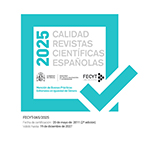“Viviendo entre cristianos como gentiles y entre españoles como bárbaros”. Indigenous Drunkenness, Christian Doctrine and Forced Migration in Central Chile, 1575-1655
Abstract
In the last quarter of the 16th century, there was, as perceived by the Town Council of Santiago and later by other authorities and officials, a resurgence of the indigenous drunkenness. In the beginning, these binges were understood as opportunities for revelry and uncontrolled drinking and sexual acts, that were without important political or ritual significance. Nevertheless, with the arrival of forced immigrants from the Araucanía Region and Chiloé, they began to be represented as social spaces where the worship of ancient tutelary spirits and the apostasy were combined with the rebel conspiracy, reviving the deepest fears among the Spanish that the Arauco would spread underground to the interior the Kingdom of Chile, nurtured by the endless repetition of drunkenness and “chueca” games and by the rumors that commonly spread through the streets of the Chilean capital.
Downloads
Article download
License
In order to support the global exchange of knowledge, the journal Revista Complutense de Historia de América is allowing unrestricted access to its content as from its publication in this electronic edition, and as such it is an open-access journal. The originals published in this journal are the property of the Complutense University of Madrid and any reproduction thereof in full or in part must cite the source. All content is distributed under a Creative Commons Attribution 4.0 use and distribution licence (CC BY 4.0). This circumstance must be expressly stated in these terms where necessary. You can view the summary and the complete legal text of the licence.











